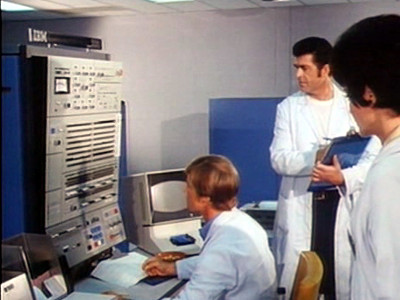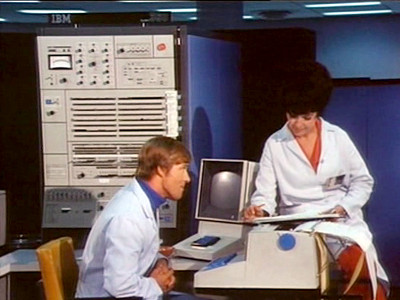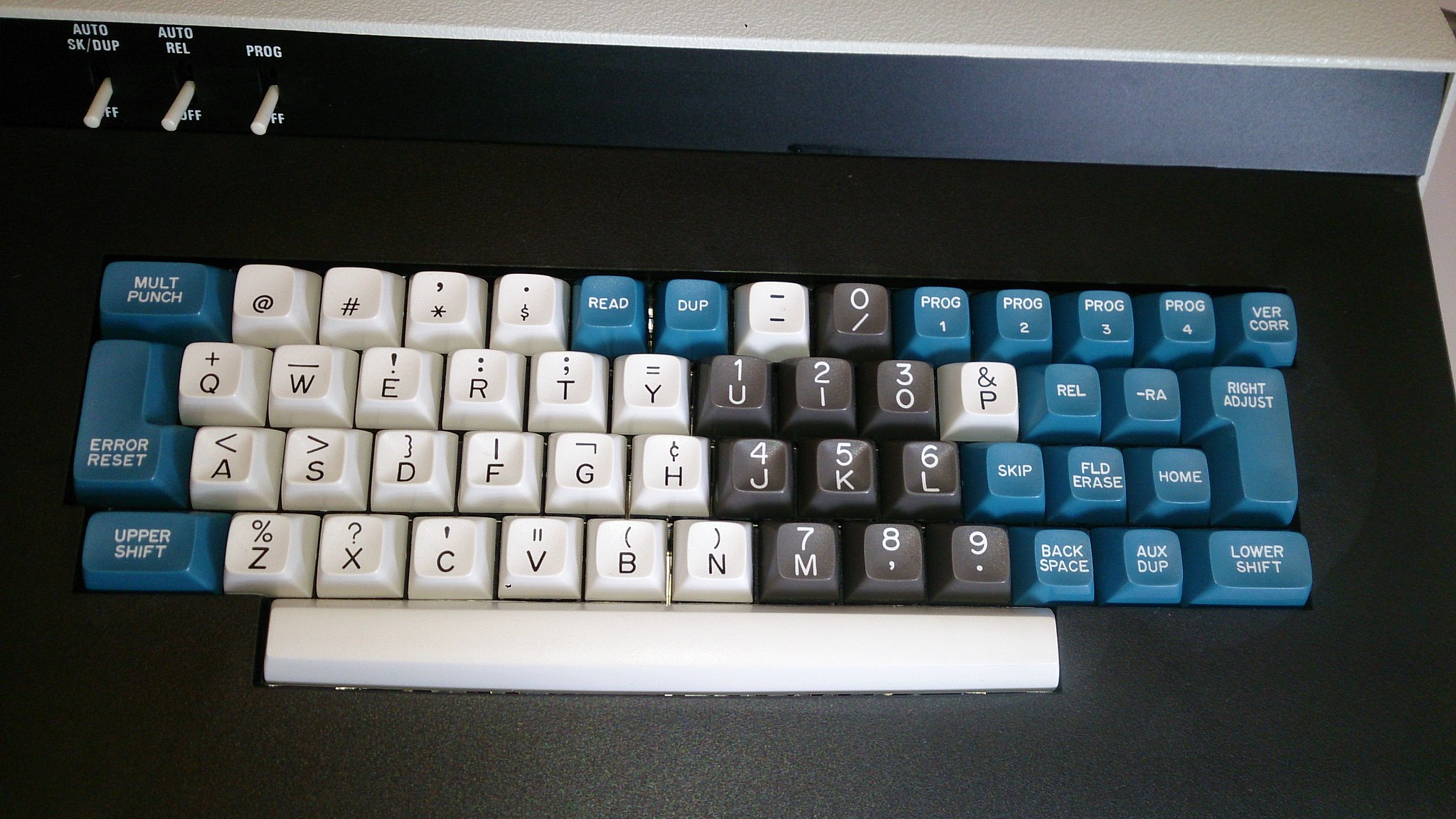homing bumps on other keys!
-
mr_a500
- DT Pro Member: -
No, I mean specific posts, like :
http://deskthority.net/keyboards-f2/hom ... ml#p262721
(yes, I just accidentally found out how to do it and answered my own question)
Here's a 60's IBM 2260 - notice no deep dish on F&J. (see full size)
http://deskthority.net/keyboards-f2/hom ... ml#p262721
(yes, I just accidentally found out how to do it and answered my own question)
Here's a 60's IBM 2260 - notice no deep dish on F&J. (see full size)
Last edited by mr_a500 on 01 Nov 2015, 20:01, edited 2 times in total.
- Muirium
- µ
- Location: Edinburgh, Scotland
- Main keyboard: HHKB Type-S with Bluetooth by Hasu
- Main mouse: Apple Magic Mouse
- Favorite switch: Gotta Try 'Em All
- DT Pro Member: µ
In general: grab the URL by selecting the little file icon beside the post time, under the user's name and avatar. Right click, copy link, ought to do it.
- Muirium
- µ
- Location: Edinburgh, Scotland
- Main keyboard: HHKB Type-S with Bluetooth by Hasu
- Main mouse: Apple Magic Mouse
- Favorite switch: Gotta Try 'Em All
- DT Pro Member: µ
60s pre-beamspring IBM computer keyboard, eh? I've heard of them before, but that could be the first picture I've seen. Nice Selectric/beamspring style caps. Were IBMs even clicky back then?
-
mr_a500
- DT Pro Member: -
That's the first you've seen of the 2260? Now I know you haven't been paying attention to my posts. I've posted at least 6 different photos of that thing.
I'd love to find out what switch is in that thing. It came out in 1964, so it can't be beam spring.
A few more photos:

 ...and the weird version with only numeric keypad:
...and the weird version with only numeric keypad:

I'd love to find out what switch is in that thing. It came out in 1964, so it can't be beam spring.
A few more photos:

 ...and the weird version with only numeric keypad:
...and the weird version with only numeric keypad:
Last edited by mr_a500 on 03 Nov 2015, 17:32, edited 1 time in total.
- seebart
- Offtopicthority Instigator
- Location: Germany
- Main keyboard: Rotation
- Main mouse: Steelseries Sensei
- Favorite switch: IBM capacitive buckling spring
- DT Pro Member: 0061
- Contact:
I've seen the 2260 before, but the picture with that kid is awesome. They had small headsets like that?!?
-
mr_a500
- DT Pro Member: -
I think that picture with the kid is around 1968-1971. Even then, everything looks super high-tech.
Notice the variants of the 2260: black surround on monitor, or just white; black around keyboard, or just white; black & blue keys, or just blue. I've never seen a numeric keypad only terminal before.
Notice the variants of the 2260: black surround on monitor, or just white; black around keyboard, or just white; black & blue keys, or just blue. I've never seen a numeric keypad only terminal before.
- seebart
- Offtopicthority Instigator
- Location: Germany
- Main keyboard: Rotation
- Main mouse: Steelseries Sensei
- Favorite switch: IBM capacitive buckling spring
- DT Pro Member: 0061
- Contact:
-
mr_a500
- DT Pro Member: -
How's this  :
:

http://www.starringthecomputer.com/appe ... =660&c=111
No, I can't find any better pictures, but I know it's real. I read a 2260 manual pdf somewhere where it was listed as an option.

http://www.starringthecomputer.com/appe ... =660&c=111
No, I can't find any better pictures, but I know it's real. I read a 2260 manual pdf somewhere where it was listed as an option.
- seebart
- Offtopicthority Instigator
- Location: Germany
- Main keyboard: Rotation
- Main mouse: Steelseries Sensei
- Favorite switch: IBM capacitive buckling spring
- DT Pro Member: 0061
- Contact:
Yeah that's better. I have no doubt it's real. Real and super rare.
- joc
- Location: The Lone Star State
- Main keyboard: IBM F104 (Unsaver) || IBM SSK
- Main mouse: Logitech M570
- Favorite switch: IBM Beam Spring
- DT Pro Member: -
The IBM 2260 keyboard was an electromechanical system similar to the IBM 029 keyboard. See chapter 2, page 17 (physical page 61) here.
Here's a screenshot of the alphanumeric and numeric keyboards from the linked PDF:
- seebart
- Offtopicthority Instigator
- Location: Germany
- Main keyboard: Rotation
- Main mouse: Steelseries Sensei
- Favorite switch: IBM capacitive buckling spring
- DT Pro Member: 0061
- Contact:
Thanks for that info joc! I found this also:
http://ed-thelen.org/comp-hist/IBM-ProdAnn/2848.pdf
http://www.columbia.edu/cu/computinghistory/2260.html
http://www.textfiles.com/bitsavers/pdf/ ... _Jul68.pdf
http://ed-thelen.org/comp-hist/IBM-ProdAnn/2848.pdf
http://www.columbia.edu/cu/computinghistory/2260.html
http://www.textfiles.com/bitsavers/pdf/ ... _Jul68.pdf
- joc
- Location: The Lone Star State
- Main keyboard: IBM F104 (Unsaver) || IBM SSK
- Main mouse: Logitech M570
- Favorite switch: IBM Beam Spring
- DT Pro Member: -
Sure, no problem. It was a lucky find. When I Google "IBM 2260 keyboard" on my laptop, the PDF isn't in the search results - I only see it when I Google "IBM 2260 keyboard" on my smartphone.seebart wrote: Thanks for that info joc! I found this also:
http://ed-thelen.org/comp-hist/IBM-ProdAnn/2848.pdf
http://www.columbia.edu/cu/computinghistory/2260.html
http://www.textfiles.com/bitsavers/pdf/ ... _Jul68.pdf
I like the vintage look of that announcement brochure.
- seebart
- Offtopicthority Instigator
- Location: Germany
- Main keyboard: Rotation
- Main mouse: Steelseries Sensei
- Favorite switch: IBM capacitive buckling spring
- DT Pro Member: 0061
- Contact:
There is actually quite a bit of information online about these old systems, but obviously never with the sole focus on the keyboards.
-
mr_a500
- DT Pro Member: -
Awesome. Thanks joc! So now we finally know the pre beam spring IBM keyboard mechanism - probably also used on the 1130 and 2250. I would have thought the terminals used something different from the keypunch.
I've seen spacebars with "Space" written on them before, but never something so elaborate as "Space/Erase Advance". I also like the "0" with the dot in the centre.
The screen closeup surprised me because of the square "O". That's one thing I hated about the TRS-80 Colour Computer font, but now I see that IBM had it back in 1964.
I've seen spacebars with "Space" written on them before, but never something so elaborate as "Space/Erase Advance". I also like the "0" with the dot in the centre.
The screen closeup surprised me because of the square "O". That's one thing I hated about the TRS-80 Colour Computer font, but now I see that IBM had it back in 1964.
- joc
- Location: The Lone Star State
- Main keyboard: IBM F104 (Unsaver) || IBM SSK
- Main mouse: Logitech M570
- Favorite switch: IBM Beam Spring
- DT Pro Member: -
Yeah, that zero is really unique and eye catching.mr_a500 wrote: Awesome. Thanks joc! So now we finally know the pre beam spring IBM keyboard mechanism - probably also used on the 1130 and 2250. I would have thought the terminals used something different from the keypunch.
I've seen spacebars with "Space" written on them before, but never something so elaborate as "Space/Erase Advance". I also like the "0" with the dot in the centre.
The screen closeup surprised me because of the square "O". That's one thing I hated about the TRS-80 Colour Computer font, but now I see that IBM had it back in 1964.
I'm even more intrigued by these keyboards after finding out they aren't beam springs. Figure 2-11 on page 64 that shows how the different components of the keyboard mechanism connect is especially interesting. I attempted to make a desktop wallpaper out of it:
The first portable system here has a similar shape to the 2260. Is it old enough to not be a beam spring?
Last edited by joc on 02 Nov 2015, 16:24, edited 1 time in total.
-
mr_a500
- DT Pro Member: -
I didn't think the 2260 keyboard was thick enough to have such a big typewriter-like mechanism.
Yes, that probably is beam spring because it came out in 1972. The 3270 beam spring terminals came out in 1971 and that's also when the beam spring patent was filed.joc wrote: The first portable system here has a similar shape to the 2260. Is it old enough to not be a beam spring?
Last edited by mr_a500 on 02 Nov 2015, 17:30, edited 2 times in total.
- seebart
- Offtopicthority Instigator
- Location: Germany
- Main keyboard: Rotation
- Main mouse: Steelseries Sensei
- Favorite switch: IBM capacitive buckling spring
- DT Pro Member: 0061
- Contact:
snuci has one of these right? I'd love to see the internals. Here it is:
http://deskthority.net/keyboards-f2/ibm ... 11864.html
http://deskthority.net/keyboards-f2/ibm ... 11864.html
-
mr_a500
- DT Pro Member: -
You didn't watch the first video? It shows the internals.seebart wrote: snuci has one of these right? I'd love to see the internals. Here it is:
http://deskthority.net/keyboards-f2/ibm ... 11864.html
I was right that the 029 keyboard is not completely separate, but that part of it fits into the desk. This makes it look much thinner than it actually is.
- seebart
- Offtopicthority Instigator
- Location: Germany
- Main keyboard: Rotation
- Main mouse: Steelseries Sensei
- Favorite switch: IBM capacitive buckling spring
- DT Pro Member: 0061
- Contact:
I did watch it. It gives an idea not an overview with details.
-
mr_a500
- DT Pro Member: -
Totally unrelated to homing bumps, but...
It looks like after the IBM 2260, there was the 2265. I've seen versions that look similar to the 2260, but then there's this (..and check out those prices!):
(earliest beam spring or still "typewriter-like"?)
Then there's this later 4979 terminal (post Series-1), guaranteed to be beam spring:
I want one of those 4979 terminals!
It looks like after the IBM 2260, there was the 2265. I've seen versions that look similar to the 2260, but then there's this (..and check out those prices!):
(earliest beam spring or still "typewriter-like"?)
Then there's this later 4979 terminal (post Series-1), guaranteed to be beam spring:
I want one of those 4979 terminals!
Last edited by mr_a500 on 30 Dec 2015, 23:11, edited 1 time in total.
- infodroid
- Location: London
- Main keyboard: V60 Matias QC
- Favorite switch: Matias Quiet Click
- DT Pro Member: -
Tabloid newspaper The Sun has allegedly uncovered the origin of the homing bump:
Except this is not true. When you actually look up the relevant patent you find it's not actually what the patent is about. Botich's idea was to have a vertical edge enclosing the outside of each hand on the home row, which means there is a left vertical edge on "A" & "J" and a right vertical edge on "F" & ";". Needless to say, the patent does not actually cover the invention of homing bumps but only a specific application of them. And it should be obvious from some cursory research that Botich's work was already covered by several expired patents. So much for journalism today!
The earliest homing mechanism is the deep dish, which was patented in 1915 by Richard D. Scott of St. Albans, Vermont (US1148721). The invention aims at "facilitating the location of certain of the key levers by operators using the touch system of typewriting" through the use of keys with "a comparatively deep, dished or concave upper face". It may also take the form of a detachable cap that is fitted over an existing (typically flat) typewriter key. The deep dish cap may be applied to the pinky keys "A" and ";", although it may be fitted on other homing keys as well. Because Scott's patent expired in 1932, one would expect to find a lot more examples of deep dish keycaps after this date.
A later 1942 patent by Frederick W. Messchaert of Oakland, California (US2350059) introduces the homing bump and covers any type of "touch-responsive indicator ... which when touched by the operator will indicate to the operator's senses the position of the predetermined key to which it is fixed". The patent illustrates the mechanism through the use of ball-like and rectangular indicators affixed to the "F" & "J" keys, although it can take any shape or position and can be used on other homing keys. Since the scope of Messchaert's patent covers any sort of homing bump, I imagine it was only until the patent expired in 1961 that they really took off.
Despite all of this, the lie that Botich invented the homing bump continues to make its way around social media and less reputable media sources...
That's right folks... You never saw a raised edge on a keycap before 2002 because they weren't invented yet! That is, until June E Botich came along, who was thoughtful enough to also think of the typewriters...The ridges on these keys were invented to improve keyboard and typewriters by June E Botich in 2002.
Except this is not true. When you actually look up the relevant patent you find it's not actually what the patent is about. Botich's idea was to have a vertical edge enclosing the outside of each hand on the home row, which means there is a left vertical edge on "A" & "J" and a right vertical edge on "F" & ";". Needless to say, the patent does not actually cover the invention of homing bumps but only a specific application of them. And it should be obvious from some cursory research that Botich's work was already covered by several expired patents. So much for journalism today!
The earliest homing mechanism is the deep dish, which was patented in 1915 by Richard D. Scott of St. Albans, Vermont (US1148721). The invention aims at "facilitating the location of certain of the key levers by operators using the touch system of typewriting" through the use of keys with "a comparatively deep, dished or concave upper face". It may also take the form of a detachable cap that is fitted over an existing (typically flat) typewriter key. The deep dish cap may be applied to the pinky keys "A" and ";", although it may be fitted on other homing keys as well. Because Scott's patent expired in 1932, one would expect to find a lot more examples of deep dish keycaps after this date.
A later 1942 patent by Frederick W. Messchaert of Oakland, California (US2350059) introduces the homing bump and covers any type of "touch-responsive indicator ... which when touched by the operator will indicate to the operator's senses the position of the predetermined key to which it is fixed". The patent illustrates the mechanism through the use of ball-like and rectangular indicators affixed to the "F" & "J" keys, although it can take any shape or position and can be used on other homing keys. Since the scope of Messchaert's patent covers any sort of homing bump, I imagine it was only until the patent expired in 1961 that they really took off.
Despite all of this, the lie that Botich invented the homing bump continues to make its way around social media and less reputable media sources...
-
Findecanor
- Location: Stockholm, Sweden
- DT Pro Member: 0011
Apple had moved to F and J in May 1998 with the PowerBook G3 "Wallstreet" laptop. The first Apple desktop keyboard with them was the Apple USB Keyboard that came with the iMac in August the same year.czyzczyz wrote: 01 Sep 2020, 04:54 I don't know when the shift occurred, but my 2019 15" MacBook Pro keyboard has bumps on F and J.
- Touch_It
- Location: Nebraska, United States.
- Main keyboard: Unicomp Classic USB 103 key (work) IBM F 4704 107
- Main mouse: Logitech g502 Proteus Core
- Favorite switch: Buckling spring (yet to try Beam Spring)
- DT Pro Member: -
I use an apple aek at work with bumps on d and k. Just an adjustment period. When I switch to another board, it maybe takes me a couple minutes to adjust. Not a big deal now. It was however weird for like the first week or 2 for me.
- Inxie
- Location: United States
- Main keyboard: IBM Model F XT
- Main mouse: Lenovo Legion M500
- Favorite switch: Buckling Spring
- DT Pro Member: -
